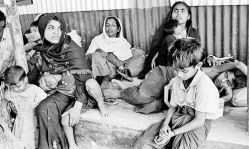Analysing Rohingya Issue
 |
Photo: asianews |
The influx of Rohingya refugees into Bangladesh is not new. Earlier in 1978 and 1991 large numbers of Rohingya refugees entered into the country. However, the ongoing Rohingya crisis as a result of sectarian clash in the western Myanmar state of Rakhine is being much talked both nationally and internationally. This is mainly because the Bangladesh Government has closed its borders although it is considering the issue from humanitarian point of view.
From the perspective of International Refugee law, the doctrine of non-refoulement seems to be relevant as Bangladesh is not a signatory to the Refugee Convention 1951. The doctrine of non-refoulement has become a norm of customary international law which prohibits a state from returning a person to a country where he has reason to fear persecution and danger. As derogation is not permissible from this doctrine, the decision of closing the borders and pushing back the infiltrated refugees seem to be in contravention of the doctrine.
The Executive Committee of the United Nations High Commissioner for Refugees (UNHCR) in its Conclusion (No: 22 of 1981) considered the heavy burdens that may be placed on a country by a mass influx. The Committee opined that a state should allow refugees on a temporary basis where it is not possible to admit them on a durable basis and also calls upon the state to resolve the problem within the framework of international solidarity and burden sharing. However, the Committee opined that the doctrine of non-refoulement must be complied with in all cases. Moreover, the Committee in its Conclusion (No: 85 of 1998) recognized that obligations to protect should not depend on burden-sharing arrangements first being in place as it is an obligation for all members of the international community to respect for fundamental human rights and humanitarian principles. In the light of the aforesaid observations of the Executive Committee, the Bangladesh Government should allow the refugees on a temporary basis and make a burden-sharing arrangement with the Myanmar Government and with the UNHCR providing overall assistance and co-ordination.
Bangladesh has been playing a key role in protecting Human Rights and serving distressed mankind particularly in the United Nations Peacekeeping missions. Thus, the Government should allow the refugees considering the plight experienced by our country-man in 1971 when they took shelter in India. The Bangladesh Government and local residents are sympathetic to the issue as the refugees are being provided with food, treatment before repatriation. But they are opposing any more entrance as nearly 30,000 registered Rohingya refugees entered earlier are yet to return and many refugees are staying illegally. Some of the refugees committed crimes, became fake voters, used fake Bangladeshi Passport and involved in criminal activities abroad thereby tarnishing the image of the country.
As Bangladesh is a least developed country with dense population, it is very much obvious for the Government not to bear any more burdens. However, the Government should handle the issue upon mutual understanding as International Organizations are ready to provide all sorts of assistance and support.
Md. Omar Bin Harun Khan is, Barrister-at-Law, Advocate Supreme Court of Bangladesh.
 |
Photo: pulitzercentre.org |
Millions of people are today forced to flee their homes as a result of conflict, systematic discrimination, or other forms of persecution. The core instruments on which they must rely on to secure international protection are the 1951 Convention Relating to the Status of Refugees and its 1967 Protocol. The Rohinga refugee situation is one of the most pressing and urgent problems facing the Government of Bangladesh from the international community and refugee law has grown in recent years to a subject of global importance.
Bangladesh is not signatory to the 1951 Refugee Convention or its 1967 Protocol. In the absence of a national refugee law, UNHCR conducts refugee status determination (RSD) of urban asylum-seekers in Dhaka.History suggests that Bangladesh hosts more than 29,000 refugees from Myanmar, who are members of an ethnic, linguistic and religious minority in Myanmar, resided in Bangladesh's south-eastern district of Cox's Bazar. This population is what remains of the 250,000 refugees from Myanmar who arrived in 1991, most of whom subsequently returned home.
The UNHCR has received earmarked contributions for Bangladesh that covered some 30 per cent of its comprehensive proposed a budget of USD 14.5 million in 2012.
The principle of prohibiting use of force is a pre-existent, customary norm in international law. This norm has been reflected in Article 2(4) of the U.N. Charter, which reads as follows: "All members shall refrain in their international relations from the threat or use of force against the territorial integrity or political independence of any state, or in any other manner inconsistent with the Purposes of the United Nations."
Article 103 of the Charter of the United Nations, narrates “in the event of a conflict between the obligations of the Members of the United Nations under the present Charter and their obligations under any other international agreement, their obligations under the present Charter shall prevail” The decisions in the Security Council that give rise to a compelling obligation upon the member states are taken mostly by means of political consideration. Article 103 obligates all member states to comply with these decisions. Since member states agreed to carry out the decisions of the Security Council in Article 25, this Article 103 obligation operates irrespective of any other obligation arising out of other treaties or agreement, even if it is contrary to those of general U.N. obligations.
Bangladeshi Government could allow the Rohinga people in its territory under a principle of the international law known as non-refoulment and request the UN to impose the decisions in the Security Council on the Myanmar authority under Article 103.
Sohul Ahmed Moku is a legal practitioner in England & Bangladesh.